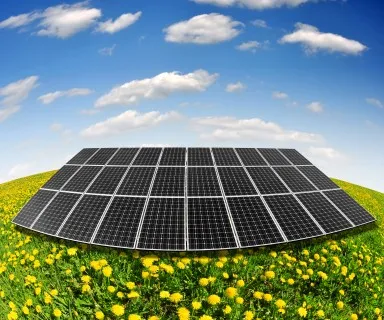
Lower equipment cost, improved contractual scheme are behind India's record-low solar bids
Analysts believe the newest tender will boost long-term open access market.
Madhya Pradesh government completed auction process for the 750 MW Rewa solar project last week, where tariffs fell to a record low of INR 2.97 (US¢ 4.4)/kWh, according to Bridge to India.
Acme Solar, Mahindra Renewables and Solenergi Power won 250 MW each. The tariff will rise annually by INR 0.05 (US ¢ 0.07)/kWh for 15 years equating to a levelized tariff of INR 3.29 (US¢ 4.9)/kWh, 24% below the previous low of INR 4.34 (US¢ 6.5)/kWh seen in NTPC’s Rajasthan tender in January 2016.
Most of this fall can be attributed to lower equipment cost (solar module prices have fallen by 26% in the last year) and an improved contractual structure. Project developers will benefit from an unconditional state government offtake guarantee and deemed generation compensation for grid unavailability.
Here's more from Bridge to India:
The tender would help open the long-term open access market especially for bulk public sector consumers. Solar power is now the most competitive greenfield source of power with a 15-45% cost advantage over other power sources. As cost of renewables falls and capacity increases, policy making focus should shift towards energy storage solutions and redesign of energy markets to address intermittency risk of renewable power.
A unique element of Rewa project is that about 25% of the power output will be sold to Delhi Metro Rail Corporation (DMRC) using inter-state open access transmission. DMRC will assume all open-access related risk and costs expected to be about INR 0.50 (US¢ 0.7)/kWh.
It will save more than 50% on its power cost bill and draw more consumers to this market. Madhya Pradesh government is already planning to develop further projects for supplies to other bulk consumers across the country.
This auction makes solar PV the lowest cost power source and a firm favourite for powering India’s future economic growth. Both consumers and IPPs will take notice and adapt their strategies accordingly.
Successful bids for new thermal power plants in India in the past two years have been between INR 3.93 – 4.98 (US¢ 5.9-7.4)/kWh. For wind power, most states are still offering FITs of about INR 4.00-6.00 (US¢ 6-9)/ kWh although upcoming auctions may bring that to about INR 4.00 (US¢ 6)/ kWh.
Gas power is simply not viable in India due to high cost (over INR 6.00/kWh) and short supply of feedstock. This clearly makes solar power a key contender for future power capacity addition in the country.
The government and private sector should now be focusing their attention on how to address intermittency risk of growing solar capacity. Cost effective energy storage solutions, about three years away, and redesign of energy markets should provide the answers.
India has already taken first steps for adopting energy storage. Recent tenders by Solar Energy Corporation of India (SECI) aim to use storage to smoothen the supply curve for solar power plants. The next step would be to use storage with solar projects to carry out peak shifting and match solar power’s supply profile with the demand profile.
India’s power sector regulations are defined for generation, transmission and distribution and most regulations had to undergo changes over the past few years to accommodate renewables in the generation mix. It is time to take out the editing pens again to add the fourth dimension of storage in India’s power sector regulations.


















 Advertise
Advertise




